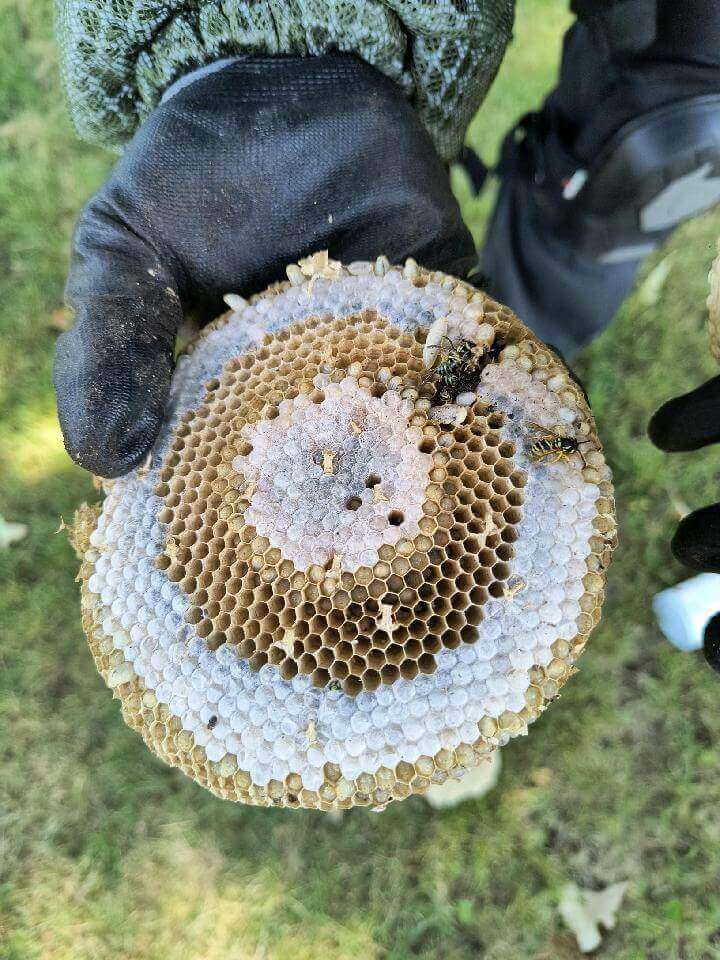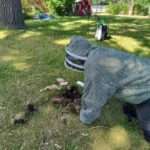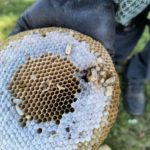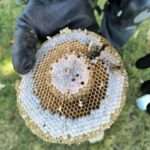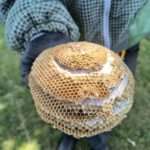Stings from wasps, hornets, yellow jackets, bees, and fire ants send roughly half a million people to the hospital emergency room every year, according to the National Pest Management Association. Protect yourself and your loved ones today. Learn how you can prevent stings on your person, and nests on your home.
Table of Contents
- 8 Tips to Prevent Wasp, Hornet, and Bee Stings this Spring
- What to Do if You Find a Ground Hornet Nest
- 3 Common Ways Pest Professionals Can Help Prevent Nests on Your Home
- Get in Touch Today!
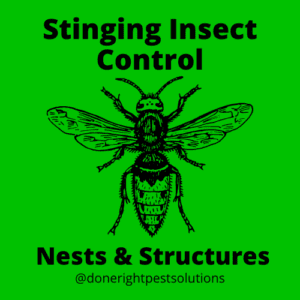
8 Tips to Prevent Wasp, Hornet, and Bee Stings this Spring
Stings hurt and bites itch, so it makes sense to take necessary precautions so you don’t hurt or itch. Moreover, some folks are highly or deathly allergic, making the need for stinging insect control and prevention at an all-time high! Check out these 8 tips to prevent wasp, hornet, and bee stings this spring!
- Eliminate standing water or other moisture issues in and around your home.
- stinging insects need a water source just like anything else
- Seal cracks and crevices
- If you have any little cracks and crevices that are sealable, this is always a good idea. Insect and rodent pests like to enter into cracks and crevices, so removing harborage areas is a good preventative tip.
- Routinely inspect light fixtures, soffits, peaks, and other areas where stinging insects are known to nest.
- Routinely inspecting for pests ensures that you know right away when a problem arises.
- A pro tip is that stinging insects love recess lighting in soffits.
- Avoid wearing dark colors
- dark colors attract more than just stinging insects, they also attract mosquitoes and ticks
- dark colors cause one to perspire more, which attracts mosquitoes and ticks even more
- light colors are best for outdoors!
- Stay away from floral prints, and sweet-smelling perfumes or colognes
- stinging insects are attracted to flowers, plain and simple
- likewise, if one wears sweet-smelling perfumes or colognes, it could attract wasps, hornets, or bees than if one didn’t wear any perfumes or colognes
- Ditch the loose-fitting garments, open-toe shoes
- the thought behind this tip is that stinging insects could fly into the openings of loose-fitting garments, which could cause surprise and many stings
- same for open-toe shoes; it is best to wear tighter/more form-fitting clothes and close-toe shoes to avoid stinging insects
- If approached by a wasp, hornet, or bee, remain calm, make no sudden movements, and if you have to move or get away, make calm, slow, fluid movements.
- panic from a person, illicit panic from the stinging insect
- making slow movements may seem contrary to human nature when one is afraid, but it could save you from some stings
- Hire a licensed and professional pest control company to preventatively treat for stinging insect prevention around the home.
- preventative sprays mean- if a stinging insect queen is looking for a nesting location and lands on the eave of your home where we’ve treated, she will die in a few days and not be able to build a nest on your home
- preventative sprays mean- if you get swarmer paper wasps that are attracted to your windows, and you get preventative treatment around the window frames and door frames, as long as they land on these areas, in a few days, these swarmers will die
We hope these tips are helpful on how to prevent stings this spring. Keep in mind, stinging insects are most active in the summer and early fall. In the spring, hornets, wasps, and bees, are just starting out their colonies. By the fall, their nest populations will exceed 60,000 members, according to Pest World.
What to Do if You Find a Ground Hornet Nest
For the full article, check out our 5 Things to Do if You Find a Ground Hornet Nest.
First things first: Locate the nest. Sometimes the nest isn’t visible, so locating the general area is helpful enough.
Next: Get to a safe place. When you see aggressive activity, make sure you’re able to get to safety as fast as you can.
Equally important: Notify others. If you live with other people, it’s important to notify them of the area where you experienced the stinging insects so they don’t do the same. The most important part of pest control is communication, so the most important thing you can do prior to getting rid of the pest issue is notifying others of the pest issue.
This is especially important if you have wasp problems in house or right outside the house. If so, seek pest control for bees and wasps immediately.
Check out these fun photos, courtesy of Master Technician Bryan, of a ground hornet nest he dug up! We typically do not remove ground nests, as they will naturally decompose.
It’s best to prevent wasp and hornet nest building in order to prevent hornet stings and wasp stings.
3 Common Ways Pest Professionals Can Help Prevent Nests on Your Home
There are 3 common stinging insect control services available to fit your needs and budget.
Our 1x Stinging Insect Service is best for if you have 1-2 visible or hidden stinging insect nests on or around your home or property. This service consists of inspection, treatment, removal of nest (if possible), and a 2-month warranty of the treated areas.
Our Spring Exterior Service/Paper Wasp Treatment is best for spring preventative stinging insect treatment. This service consists of inspection, power spray of all eaves, soffits, gutters, fascia, etc. of your home to prevent stinging insect nest building. If there are any nests on the area, they will be treated and removed. This service comes with a 2-month warranty.
Our Peak Seasons Plan/Annual Residential Pest Control Program is ideal for folks dealing with stinging insect allergies. This service includes spring, summer, and fall, preventative applications, and a 12-month warranty.
We hope these service offerings are helpful for you when considering what level of pest control your home might need. There is a nice peace of mind that can come with a year-round approach, but if you just have stinging insect issues in one season a year, it would make more financial sense to just treat in the spring or the fall, for example.
Ultimately, we’d love to be the one you call, text or email, with any stinging insect services and questions.
Get in Touch Today!
When you contact Done Right Pest Solutions, you will talk to a person. You will get top-tier customer service, and a competitive price over the phone or via email. We like to include all service details up front so you know what you’re getting, or so that you can make an educated decision on which company to hire.
We hope you’ll hire us!
Call or text us at 651-342-9489. Or email us at donerightpestsolutions@gmail.com.
We’re here when you need us,
Done Right Team

